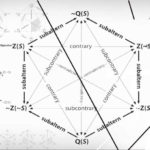We run our website the way we wished the whole internet worked: we provide high quality original content with no ads. We are funded solely by your direct support. Please consider supporting this project.
The Hexagon of Opposition
Throughout the western philosophical and theological tradition, scholars have assumed that the future can be adequately described in terms of what will and will not happen. In this essay I, Alan Rhoda and Tom Belt argue that this assumption is mistaken, for the logical contradictory of will is not will not but might not. Conversely, the logical contradictory of will not is not will, but might. We suggest that the traditional assumption that the future is exhaustively describable in terms of what will and will not occur is influenced by an inadequacy in Aristotle’s famous “Square of Opposition.” We correct this deficiency and demonstrate that an adequate logical model of the future must incorporate might and might not, producing a “Hexagon of Opposition” rather than a “Square of Opposition.”
Click here to download this essay:
The Hexagon of Opposition: Thinking Outside the Aristotelian Box
Category: Essays
Tags: Essay, Open Theism
Topics: Defending the Open View
Related Reading

The Logical Hexagon Made Simple
by: Greg Boyd The Hexagaon in a Nutshell For those of you who don’t have the twenty to thirty minutes it will probably take to read this essay but who nevertheless would like to have some idea of what the Logical Hexagon is all about, here is my two sentence elevator speech: The Logical Hexagon…

Why do you espouse Open Theism?
Open Theism refers to the belief that God created a world in which possibilities are real. It contrasts with Classical Theism which holds that all the facts of world history are eternally settled, either by God willing them so (as in Calvinism) or simply in God’s knowledge (as in Arminianism). Open Theists believe God created…

How do you respond to 1 Kings 13:2–3?
The Lord proclaims against the pagan alter of Jeroboam, “O altar, altar, thus says the Lord: ‘A son shall be born to the house of David, Josiah by name; and he shall sacrifice on you the priests of the high places who offer incense on you, and human bones shall be burned on you.’ He…

God is Flexible: Romans 9, Part 4
As we continue this series on Romans 9, [Here’s the link to the first post in the series.] today we will look at the famous potter/clay analogy. Most tend to interpret the potter and clay image as supporting the deterministic view of God. But in fact, it teaches just the opposite. This is the fifth argument…

New Testament Support for the Warfare Worldview
Warfare in Jesus’ Ministry The theme of God striving to establish his sovereign will (his Kingdom) on earth over and against forces that oppose him is prevalent in the New Testament. In keeping with the apocalyptic climate of the time, there are many references to angels at war with God, demons that torment people, and…

What is the significance of 2 Samuel 24:12–16?
The Lord gives David three options of how Israel will be judged. “Three things I offer you; choose one of them, and I will do it to you.” This verse reveals how the Lord gives people genuine alternatives and responds to their choices. If God foreknew what David would choose, however, the purpose of the…
